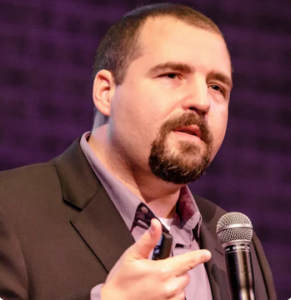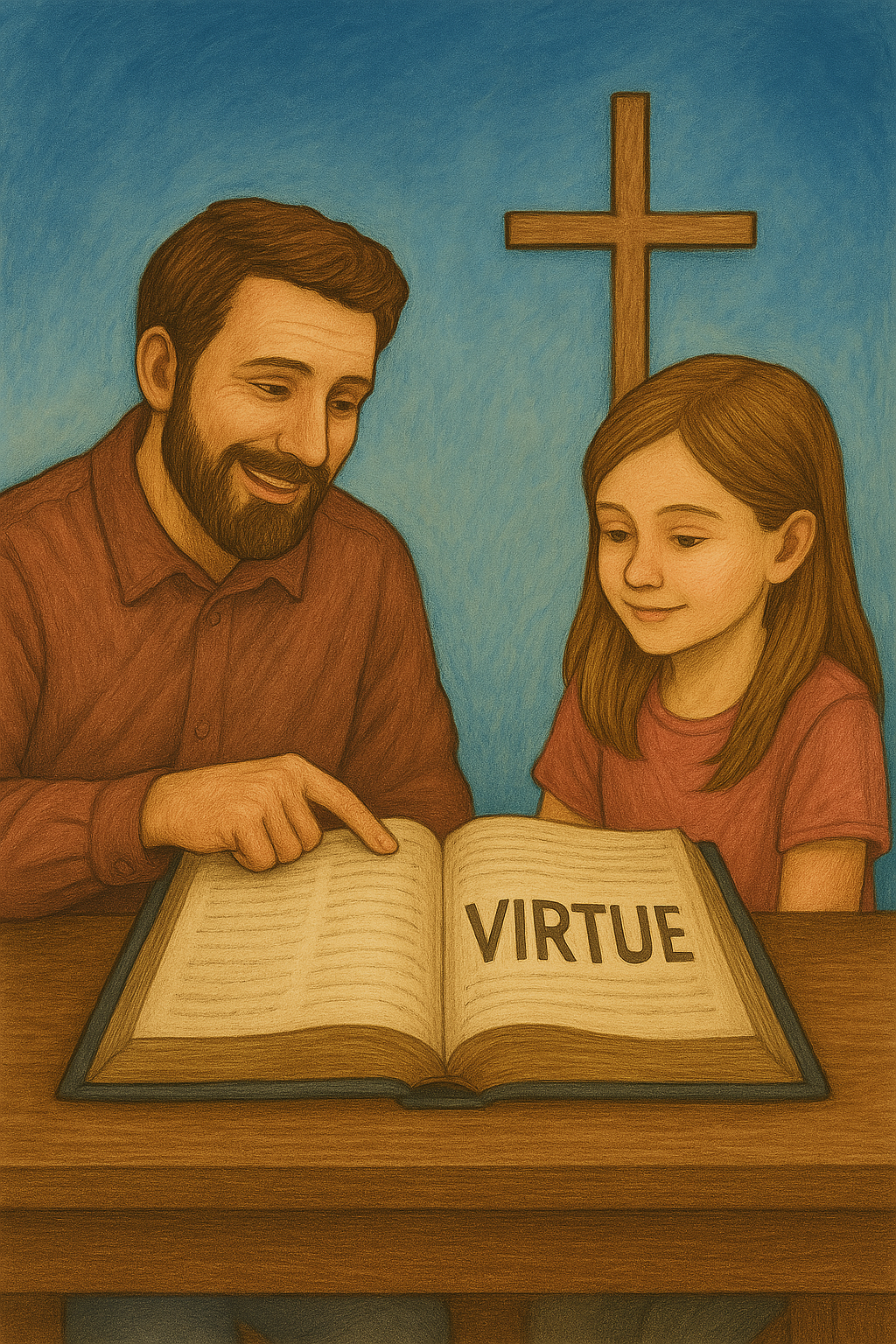By: Thomas McCuddy, D.Min. | June 15, 2025
Are we raising our children and discipling our students to be successful or to be virtuous? It’s a haunting question. In the Christian world, success often means knowing the Bible, winning arguments, defending the faith, and staying active in ministry. These are all good things. But if we stop there, we might miss the more fundamental goal of the Christian life, which is transformation into the likeness of Christ. A student can refute errors and still be full of pride. A church member can serve every Sunday and remain spiritually shallow. A child can memorize Scripture while becoming hard-hearted.
In a world saturated with information and fixated on production, we need cultivation of virtue.
Knowledge Without Virtue: A Warning from Experience
As a former youth pastor for 15 years and now in my 15th year as a college professor, I’ve seen firsthand what happens when Christian education focuses on knowledge transfer without character formation. I once taught students rigorous apologetics, hermeneutics, and doctrine. Many excelled intellectually. Yet years later, some of those same students walked away from the faith. They could argue the truth, and they knew the truth. However, due to disordered loves, they did not care about the truth. They were trained to win, not endure.
One of my college students became a rising star in apologetics, even inviting me to his home for Bible studies. Now, he is a YouTube personality attacking the very truths he once defended, tearing down churches rather than building them up. Another graduate, well-versed in Scripture, is currently sowing division in a local church because he refuses correction. He uses the Bible not as a tool for truth, but as a weapon to justify himself. These aren’t just unfortunate exceptions. And this isn’t the failure of apologetics and theology, per se. They are the inevitable result of training minds without forming hearts.
Virtue and Maturity: Biblical, Not Optional
The idea of virtue isn’t some Greek philosophical import tacked onto Christianity. Nor is virtue a “Catholic thing,” though the Roman Catholics do speak more about virtue than any other denominational group. We maintain the New Testament embeds virtue into the vision of Christ-like maturity. Take Ephesians 4. Paul urges us to grow up into Christ, to no longer be children tossed to and fro by every wind of doctrine. But what does this maturity look like? It isn’t merely about having the right arguments and being able to recite the creeds and confessions. Maturity is stability. Maturity is possessing the deep, abiding disposition that compel us to follow Christ. These things we call virtue.
A good image is the difference between a tactician and a bodybuilder. A tactician knows how to move and react while a bodybuilder bears weight. The bodybuilder with muscles and a disposition of strength is a person who can stand firm physically. In many churches and families, we’re building tacticians who know how to respond in the moment, but we’re not building spiritual bodybuilders who can endure, support others, and remain standing in the storm.
Four Important Biblical Concepts
So how do we become those kinds of people? Scripture gives us four important concepts that paint a picture of the virtuous Christian life:
Arete
(1) 2 Peter 1:5–8 – αἵρετή (aretē): Peter says to supplement our faith with virtue. Without virtue, the knowledge of Christ becomes ineffective and unfruitful. Virtue is moral excellence. It is the soul aligned with God’s goodness. Additionally, those who study logic will recognize the immediate inference: When these qualities are ours and are increasing, we will be effective and fruitful in the knowledge of Christ. The key is not sophisticated programming or synergistic church staff. It’s virtue.
Kalos
(2) Matthew 5:16 – καλός (kalos): Jesus says our good works should shine so that others glorify the Father. This word means more than useful. It means beautiful or noble. Our lives should be visibly attractive in holiness. However, if we don’t possess virtue, that means we possess vices. We can mask the vices of pride and arrogance with a false humble demeanor, and we can know how to act humbly in any given situation, but the virtuous person is disposed to humility. That which is good in their soul cultivated by practice and the sanctifying grace of the Holy Spirit springs forth beautifully.
Dioko and Epektasis
(3) Philippians 3:12, 14 – διώκω (diōkō) and (4) 3:13 – ἐπέκτασις (epektasis): Paul says he presses on (dioko) toward the prize. The Christian life is pursuit. It is not passive. Virtue involves striving for godliness with effort. Paul also describes himself as stretching forward (epektasis). Christian maturity isn’t static. It’s a reaching, a yearning for more of Christ. These two ideas have been used by the early church to develop full systems of pressing and stretching. Virtue requires effort, and the grand mistake we have made in our spiritual walks is thinking that we have no impact in our own spiritual growth. God is the ultimate cause of spiritual growth, just like He is the ultimate giver of health. But just like my part in health is to eat good food and exercise, my part is also to nourish my soul and practice righteousness.
These words remind us: Virtue is not accidental. It must be cultivated.
Are We Rewarding the Wrong Things?
In our families, churches, and schools, what are we rewarding?
- Do we praise quick answers more than deep wisdom?
- Do we honor charisma over integrity?
- Are we shaping students to perform, or to persevere?
The danger is subtle. We may produce Bible-quoting, church-serving individuals who outwardly know the form of righteousness, but inwardly deny its power being unkind, unteachable, or unfaithful
Cultivating Virtue in Ordinary Life
What can we do?
- Model it. Virtue must be caught. Children and students need to see us repent, forgive, and practice humility. Be honest about your own sanctification. We promote the same idea in our Virtuous Discipleship material. If we are going to make disciple-makers, our disciples must see us being Christ-like.
- Talk about it. Virtue must be taught. Ask questions like: “What kind of person do you think God is shaping you to be?” Use language like patience, self-control, courage, or gentleness. Make sure the terms you use have content. Knowing a word is different from knowing what a word means and how to manifest the concept.
- Celebrate it. Virtue must be sought. When someone shows growth in character, praise it. Celebrate love over cleverness. Celebrate honesty over achievement. If they do not desire righteousness, if they do not hunger and thirst for it, they will not pursue it.
These small practices form souls. They build the kinds of people who will not only know the truth, but live it with grace and perseverance.
Conclusion: One Change to Make
So ask yourself: Are you raising or discipling someone to be successful, or to be virtuous? The call of Ephesians 4 is a clear rallying cry to grow up into Christ. This growth requires intellect, this growth is magnified through gifting, but it is a growth in all things. Yet, one thing remains: you cannot give what you do not have (alternatively: you cain’t give what you ain’t got). If we are going to help others cultivate virtue, we must ourselves be virtuous. Let us begin adding with our faith these virtues so that we may not be ineffective or unfruitful, and we can develop young men and women who likewise live in the goodness of Christ.
About the Author
Thomas McCuddy, M.A., D.Min.
 Dr. Thomas McCuddy brings a wealth of ministerial experience to the team. Throughout Eastern North Carolina, Thomas has served in various pastoral roles. He heads the Apologetic Department at Carolina College of Biblical Studies. Additionally, he serves as the President of Families of Virtue Ministries and assists with various ministries in South Africa. Formerly, he worked with the late Dr. Norman Geisler at NGIM (Norm Geisler International Ministries).
Dr. Thomas McCuddy brings a wealth of ministerial experience to the team. Throughout Eastern North Carolina, Thomas has served in various pastoral roles. He heads the Apologetic Department at Carolina College of Biblical Studies. Additionally, he serves as the President of Families of Virtue Ministries and assists with various ministries in South Africa. Formerly, he worked with the late Dr. Norman Geisler at NGIM (Norm Geisler International Ministries).
McCuddy earned his Doctor of Ministry in Apologetics degree from Southern Evangelical Seminary along with other degrees from the school. Originally hailing from Memphis, Tennessee, Thomas is a graduate of Middle Tennessee State University, where he earned a degree in mathematics. Currently, he resides with his wife and children in Fayetteville, North Carolina.
(c) 2025. Bellator Christi.





